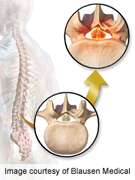Preoperative depression influences self-reported patient satisfaction after revision lumbar surgery, independent of the surgery's effectiveness, according to a study published in the May issue of The Spine Journal.
(HealthDay)—Preoperative depression influences self-reported patient satisfaction after revision lumbar surgery, independent of the surgery's effectiveness, according to a study published in the May issue of The Spine Journal.
Owoicho Adogwa, M.P.H., from Vanderbilt University in Nashville, Tenn., and colleagues retrospectively studied 53 patients undergoing a revision surgery (neural decompression and instrumented fusion) for symptomatic same-level recurrent stenosis. Health state values (EuroQol-5D), disability (Oswestry Disability Index), pain (visual analog scale for leg pain or low back pain), depression (Zung self-rating depression scale), and Short Form 12 physical and mental component scores were assessed in a questionnaire at baseline and at two years. Preoperative Zung self-rating depression scores were also assessed.
The researchers found that two years after surgery there were significant improvements in all patient-reported outcome measures. Zung depression score was significantly associated with patient dissatisfaction two years after revision lumbar surgery (odds ratio, 0.67), independent of postoperative improvement in pain and disability (surgical effectiveness).
"Quality improvement initiatives using patient satisfaction as a proxy for quality should account for the patients' baseline depression as potential confounders," the authors write.
Several authors disclosed financial ties to the medical device industry.
More information:
Abstract
Full Text (subscription or payment may be required)
Journal information: Spine Journal
Health News Copyright © 2013 HealthDay. All rights reserved.
























